Who is IQM?
IQM is the only national inclusion award in the UK. For over 20 years and in over 20 countries, schools, MATs and Local Authorities use the Inclusion Quality Mark to recognise exemplary inclusive practice.
Get in touch for your FREE school information pack today.
Huntcliff School Achieves Centre of Excellence
July 28, 2023
Huntcliff School has achieved the Inclusive School Award with Centre of Excellence status.
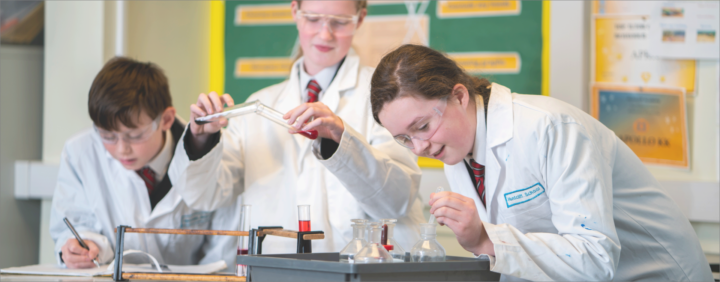
Supporting Positive Behaviour Transformation
Huntcliff School currently caters for approximately 550 students and is situated in rural North Lincolnshire. The proportion of students with Special Educational Needs and Disabilities (SEND) known as SEN support or with an Education, Health and Care Plan (EHCP) is above average.
Most students are transported to school via a network of buses. An after-school mini-bus and driver have been employed to allow after-school interventions to take place, removing the barriers to participation.
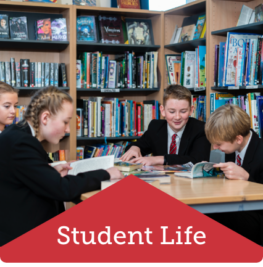
The school has signed up to the DfE behaviour hub network and has introduced a range of support and intervention plans for students with the aim of supporting positive behaviour transformation. The highest level is the Pastoral Support Plan (PSP) for children at risk of exclusion, detailing the nature of concerns, agency involvement, location of behaviour, triggers, attendance, conduct, achievement and the background of the child including positive qualities.
The PSP aims to put down clear targets, recommended strategies and a review and monitoring framework agreed upon with all stakeholders. Sitting a level below the PSP is an Individual Behaviour Plan or Integrated Service Plan (ISP) which aims to set targets in a similar way to the PSP. These plans are often also incorporated with personalised timetables and a counselling schedule.
Nurture Provision
The Nurture Provision, or ‘Indigo’ classroom is for students that are not mainstream ready. The Indigo group accesses provision due to a primary learning need where the student is well below age expected attainment. During a tour of the school, our Assessor was privileged to visit this nurture class in its setting. Currently catering for 13 students, the group accommodates eight KS3 students all with a range of SEND needs. Housed in a more mature version of the primary classroom model that many of the students feel secure in, it is easy to see why the students feel nurtured and are making progress. All were keen to show me and talk about their chocolate bar designs, manufactured to a high standard in their catering lesson.
This year, the Indigo students have also worked with ‘Café Indie’, supported by the Local Authority (LA) After-School Safety and Enrichment for Teens (ASSETS) team in Scunthorpe to produce a range of ceramic objects based on a theme of ‘This is Me’.

The aim is to further develop the Indigo provision and wider model into a KS3 Early Intervention Hub in September focussing more on students with Social, Emotional and Mental Health (SEMH) Needs, very much aligning itself with the DfE green paper reforming SEND and Additional Provision (AP) in schools.
This year, there have been two transition days for the new Year 7 cohort plus an additional half day for vulnerable students. The school has a wide geographic catchment area and is fed by more than 20 primary schools, some of whom only send one or two students, so this additional, inclusive adjustment helps the young people start their secondary education on the best footing before the main transition days.
Our Assessor met the Inclusion Mentor who is newly THRIVE trained and runs the ‘Reflect’ room. She explained that the one-to-one conversations regarding what they can do to ‘put things right’ had seen a reduction in repeat behaviour over the past year.
There is also an art wellbeing/therapy group where students with similar issues and problems are identified and placed together through a peer support model.
Offsite AP is used by a very small bespoke group of students who are offered part-time placements; one or two days per week. It is loosely based on forest skills to help re-engage with learning. There are plans to develop more in-house AP in the future to meet the identified needs of the older cohort of students.
Reading was Noted as a Priority
In form time, reading takes place at least once per week. Leaders wanted reading to be more prominent in the school following a recent OFSTED where reading was noted as a priority. A rota of form-time activities incorporates the new reading strategy and is popular with both staff and students.
Staff look at the reading ages when setting work and this is fed through to the teachers via Schools Information Management System (SIMS). In Years 7 and 8 everyone uses accelerated reader and in Year 9 this prepares them for GCSE Literature. Every child is tested on the National Foundation for Educational Research (NFER) group reading test and any child below chronological age is further tested using LATS (Lucid Assessment Testing for Schools) to give a wider understanding of need based on a strand model.
From this, Reading Intervention Groups are created based on the same type of need or strand. The raft of interventions employed includes Read/Write (phonics, spelling, reading comprehension).
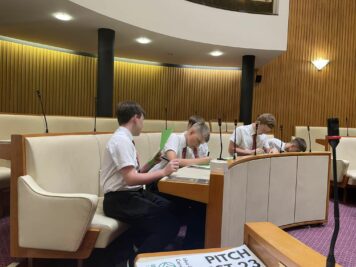
The evaluation of the first six months of the programme is showing that: 86% of students made more than good progress (making more than 16 weeks of progress over the four months); 31% outstanding (more than a year’s progress in the same time frame); 7% made more than two years and six months progress; One student made over three years and ten months progress!
For those that have not made good progress, this was identified as an issue relating to poor attendance and attitude to learning. This is being fed into the development of a different reading programme for teenage readers and using SIMS to pass on reading group reminders to staff electronically. All staff have live reading data passed through to them to help inform their planning and differentiation of lesson material.
Staff Feedback is Incredibly Positive
Staff feedback is incredibly positive, teacher-led reading with students and group reading has been successful. The parent our Assessor met [having autistic and Attention Deficit Hyperactivity Disorder (ADHD) children], loved the Indigo small group start to learning, leading to opportunities to join the mainstream lessons. She felt well supported by the pastoral team and their children were able to access support and wellbeing including art therapy when needed. Staff see the SEN department as a strength, so much so that staff have chosen Huntcliff because of this.
Post-16 access, careers talks and their pathways are seen positively by the parents.
In the meeting with the Pastoral team, leaders explained how they were moving to a vertical year-group system. Benefits include a consistent approach for families and CIM/TAC meetings. Resilience and life skills sessions are being delivered by The Fisher Family Trust (TFTF) mentor based on the age profile and individual needs of students. The new house system has garnered support as the parents will have one consistent house lead to go to.
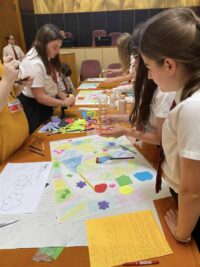
Further, additional support for students is brokered through Acorn (a special school in Lincoln) and provides six-week outreach sessions for students on the SEND spectrum including Autism.
A councillor visits the school for a day and a half but from September this is being increased to three full days, one of which will be a female councillor. Topics covered included bereavement, aspects of Child and Adolescent Mental Health Service (CAMHS) and SEN agency signposting as well as helping to diagnose needs during his sessions.
With Me in Mind do one-to-one sessions covering eight-week and twenty-week Cognitive Behavioural Therapy (CBT) sessions covering cognitive behavioural strategies to work on resilience as well as signposting to their parent CAHMS service. This has benefitted the school due to its fast-track nature.
Improving Attendance
The school has taken on the ‘attend framework’, adopted by the LA with the aim of further improving attendance. Based on three levels of ‘booklet’ for students, parents and professionals, the system provides different recommended strategies of support to improve attendance and long-term persistent absence (PA).
The team has further expanded the transition process by completing pre-admission home and school visits to identify potential attendance risks and put advance interventions in place. Due to the high number of students travelling in from Gainsborough, door-knocking attendance sweeps to improve attendance is a continued issue. A total of 84% of students are from outside the area.
Pupil premium funding is used to support students in financial need. There is an online shop selling ‘pre-loved’ uniform as well as travel funding to subsidise the many bus routes needed to bring in students.
A breakfast club has been launched a year ago to provide free toast and cereal bars before the start of the school day. This is well utilised and was expanded to included pre-exam revision sessions before and after school for Year 11 students.
An external counselling service called ‘Think for the Future’ supplements the inclusion agenda and is aimed at supporting students with low self-esteem. Our Assessor participated in a session focussing on how music and emotions are linked, delving into deep discussions regarding how we all associate music differently based on life experiences and our individual moods. It was engaging and thought-provoking. The students showed a very mature outlook throughout and engaged to a very high level.
Lunchtime ‘buddy’ club has been put in place for students struggling with the noise and hustle/bustle at lunch. There is a fantastic sensory garden in the central outdoor courtyard. Designed by students and built by school and community volunteers, it provides a multi-use learning space. Furnished with planters, seating benches, a water feature, a bug hotel, a birdbath and ceramic tiles for decoration, the outdoor classroom and recreational space is truly a highlight of the school. The students and staff show enormous pride in their creation and rightly so.
Student Voice is Integral
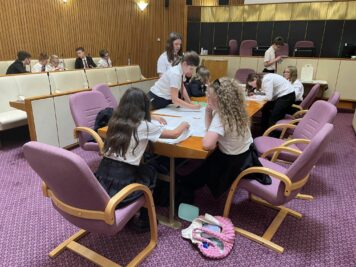
Fundraising is carried out for the ‘Be the Difference’ charity in Gainsborough for summer holiday activities and social and emotional support during the summer holiday break.
‘With Me in Mind’ is going to come in September and train Ambassadors with a particular focus on challenging bullying, giving students voice and helping with the interview process for potential new staff.
Student voice is an integral part of the school and our Assessor was fortunate to meet seven students for a round table discussion. They felt that the school has increased the opportunities for inter-school sports activities and trips and visits as a whole since last year.
Some Year 9 students have completed a sports leadership qualification and delivered at neighbouring schools and leisure centres. The students spoke highly about their opportunities and involvement in the transition days and open evenings. The students love the badge system which rewards positive achievements including wellbeing and student council participation. Hot chocolate Friday, postcards, emails and phone calls home all go down very well.
The students were aware of the Indigo SEN students and their contribution to school life and the ‘life of a chick’ project. They articulated very well the support that the form system gives and the tutors. Every member of staff is basic first aid trained. There are also art therapy sessions, featuring ‘mini clay monsters and Christmas tree decorating’ that ‘allows you to take your mind off things’.
The end of each term features a rewards assembly with prizes for attendance and achievement.
Teachers Understand Students Well

Teachers understand their students very well and the students articulate that they make good progress in the lessons where their needs are understood. They feel well supported by the pastoral system as a whole and all the students our Assessor spoke to felt that they had a trusted adult that they could turn to if the need were to arise.
Cultural capital and social school visits are popular and well-attended. Students have been abroad and are going to Italy for a football/netball competition, Liverpool for Blood Brothers theatre trip, London for the natural history museum, Mary Poppins and Harry Potter World, plus a Kingswood residential and Yorkshire Wildlife Park arts day.
The student-led Eco-Committee plans environmentally sustainable events such as farm work, park cleaning, battery collections and a visit to the power plant in Scunthorpe.
The library is a recently renovated ‘safe space’ and the students spoken with fully appreciated the new upgrades and renewed emphasis on reading for pleasure.
They are looking forward to next year’s play, ‘Matilda’ the musical. A professional music teacher leads on the choir and on a London trip and a visit backstage to ‘Mamma Mia’.
Highlight of the Day
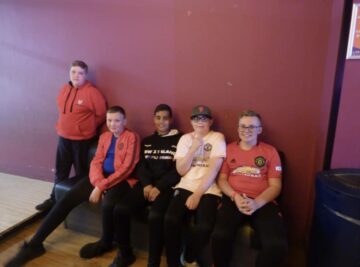
Our Assessor concluded, “The highlight of my day was after lunchtime when one of the Year 7 Indigo students gave me his very personalised tour of the school. As well as being in the school’s nurture provision, he is spending an increasing amount of time in mainstream lessons with his peers. This is going very well and he was keen to introduce me to his teachers, show his achievements and eloquently explain his learning journey.
“We discussed reading and, after explaining how he struggled to connect long paragraphs of text with characters, he showed me the graphic novel that he was currently reading. Whilst still laden with challenging text, due to the connected speech and thought bubbles, he was able to follow the story and make academic progress alongside his fellow students.”
Find out more about the IQM Inclusive School Award
If your school is interested in obtaining the IQM Inclusive School Award or you wish to talk to a member of the IQM team please telephone:
028 7127 7857 (9.00 am to 5.00 pm)
or email: admin@iqmaward.com for further details.
Want more information on the IQM Award? Click here to request your free IQM information pack
Other Posts

About IQM
The only national award for inclusion in the UK, IQM has been committed to recognising exemplary inclusive schools for over 20 years and in over 20 countries around the world. The three awards allow schools and organisations to celebrate their inclusive practice against nationally recognised framework.
Site Links
© 2026 Inclusion Quality Mark | website developed & cared for by digidoda


